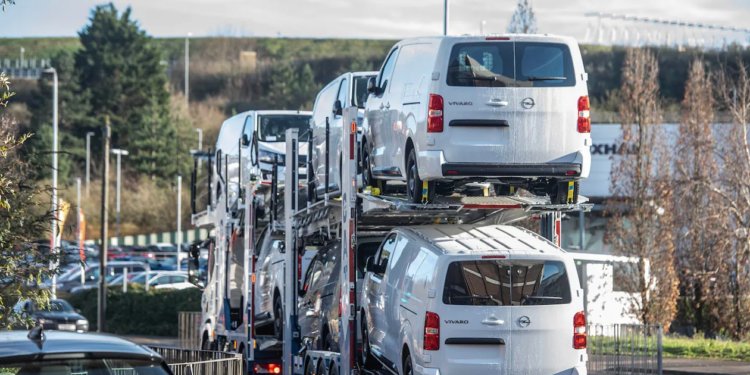Britain’s Net Zero policies, such as the incremental ban on non-electric cars, are a fiasco, now costing serious jobs and threatening entire regional economies, says Liam Halligan in the Telegraph. Here’s an excerpt.
The decision to close [the Luton van-making factory] was taken by Stellantis – the world’s fourth-largest auto-making conglomerate, comprising European and U.S. brands including Chrysler, Fiat and Peugeot, as well as Vauxhall.
Carlos Tavares, Stellantis Chief Executive, said earlier this year that the zero emissions vehicle (ZEV) mandate was making car-making in the U.K. economically unviable – which is obvious, to anyone who has been paying attention.
Much of our political and media class, protecting their eco-credentials and averse to awkward details, have waved away the warnings. But Britain’s Net Zero policies, not least ZEV, are now imposing existential damage on parts of the country least able to withstand major economic shocks.
From 2035, the sale of new petrol and diesel cars is to be banned, with second-hand sales remaining legal. That’s the law in the U.K. and across the European Union.
Labour’s manifesto pledged to bring that ban forward to 2030, which is where it was under the Tories until Rishi Sunak moved the target back to 2035, in line with the EU. But Sunak only moved the headline date back five years, with the underlying “transition” period remaining the same.
The result is that, since January, U.K.-based carmakers have faced extremely stiff fines if 22% of the cars they sell in Britain aren’t fully electric – having to shell out an astonishing £15,000 for every vehicle by which they fall short.
The target ratchets up to 28% next year, incrementally rising to 80% by 2030 (or 70% for vans) – even if the complete ban remains at 2035.
But consumers aren’t buying it. Sales of electric vehicles (EVs) remain low for all kinds of reasons, including a still-poor charging network, concerns about battery performance and related ‘range anxiety’. New EV sales are far lower than official forecasts, having stalled at less than a fifth since 2022 despite carmakers offering deep discounts and ongoing tax breaks for company-bought EVs. …
What with the closure of Port Talbot steelworks and the Labour’s ban on new drilling in the North Sea, Net Zero policies are now seriously riling the U.K.’s trade unions.
Gary Brown, head of the GMB, the UK’s third-largest union, says Labour’s green policies are “hollowing out working-class communities”. No wonder Business Secretary Jonathan Reynolds is now “listening” and has pledged to “consult” on these ZEV rules. …
But powerful vested interests and party donors – including the EV charging industry and its financial backers, along with power companies producing the most expensive electricity in the developed world – are pushing Labour to hold its nerve.
Britain’s Net Zero policies – particularly those relating to EVs – are a fiasco, now costing serious jobs and threatening entire regional economies. This is what happens when politicians think they know best – putting vanity and ideology above economic and commercial logic.
Worth reading in full. Follow Liam on X.











To join in with the discussion please make a donation to The Daily Sceptic.
Profanity and abuse will be removed and may lead to a permanent ban.
Anyone who has recently lost a family member or friend to a treatable/survivable cancer will be greatly concerned by the implications of this article.
All in Whitehall/Westminster who supported vaccine mandates should be paying attention, as should the covid ‘inquiry’.
“All in Whitehall/Westminster who supported vaccine mandates should be paying attention, as should the covid ‘inquiry’.”
Not going to happen. The jabs are as we all agree, “safe and effective”.
Repeat after me
“safe and effective”
“safe and effective”
There. Don’t you feel better already?
Well, I mean it’s a good job that our wonderful bigpharma vaccinologists, aka genetic engineers, immunologists, doctors, UKHSA, MSM, etc. had absolutely no way whatsoever of knowing there might be undesirable (?) consequences flowing from their mass vaccination campaigns/mandates.
Otherwise some people might demand some form of retribution.
Tick Tock…
And here’s my old favourite of which the matters mentioned all the world’s vaccine safety bodies were aware. And if not, why not?
https://www.authorea.com/users/455597/articles/552937-innate-immune-suppression-by-sars-cov-2-mrna-vaccinations-the-role-of-g-quadruplexes-exosomes-and-micrornas
“My work never takes cheap shots at vaccinated people and does not make unfounded, dire predictions not supported by evidence.”
Not taking a pop at you Igor – great article – but that’s, on the very best interpretation a, “fingers crossed” attitude from big Pharma. How professional of them.
I lost two friends last year to hyper aggressive cancers. One died within three months of diagnosis and the other died six months after diagnosis.
Currently three family members under treatment. A number of acquaintances have also been diagnosed. To be honest I have lost track of details and funerals have been far too frequent.
2 here – blamed on blastoma such and such. Fully paid up Rona tard stabbees and members. Could not get enough. Within 3 months both had the ‘hidden cancer’ pace Dr quack. ‘It was always there, just undiagnosed‘. ‘Spurious cowpox‘ cried Jenner, when he received yet another letter from someone, saying his son or daughter died from his poisoned shot. ‘Previous condition, undiagnosed‘ scream the fake science and cult of retards who pray at the church of $cientism when cancers, encephala and death follow the stabbinations. Thank god I was stabbed…my cancer would have been soooo much worse.
https://off-guardian.org/2023/11/25/how-your-dna-is-being-used-against-you/
A long and in-depth article outlining the ways in which our DNA is being collected. Obviously this is all intended to keep us safe. It really has nothing to do with the so-called elites wishing to live forever. Honest.
John Campbell and Oncologist Angus Dalgleish were discussing this recently.
https://m.youtube.com/watch?v=PnJ5T1Enwq4
Cancer Rise Coincides With Covid Jabs
latest leaflet to print at home and deliver to neighbours or forward to politicians, media, friends online.